Discover and read the best of Twitter Threads about #polisciresearch
Most recents (19)
Very happy to share our new article with @VanDitmars on socialization, family origins and class voting published in @BJPolS #polisciresearch #OpenAccess
👉ow.ly/W3aC50KfK2R
Our study shows a legacy of industrial class conflict still affecting voting behavior today.
👇🧵
👉ow.ly/W3aC50KfK2R
Our study shows a legacy of industrial class conflict still affecting voting behavior today.
👇🧵
Using panel data from 🇬🇧, 🇩🇪 and🇨🇭we find that children of working-class parents are more likely to vote for the left, even when they move to a different social class. The impact of parental class of origin on left-wing support is comparable or even greater than voters’ own class 

Part of the current middle-class left-wing support is grounded in their working-class roots. It demonstrates an inter-generational legacy of industrial class conflict.
🚨 How have bureaucracies historically influenced the fates of economies & societies? 🚨
In a new chapter for the Oxford Handbook of Historical Political Economy (ed. @jaj7d & @jaredcrubin), I answer this & other questions.
janvogler.net/HPE_Bureaucrac…
#polisciresearch #EconTwitter
In a new chapter for the Oxford Handbook of Historical Political Economy (ed. @jaj7d & @jaredcrubin), I answer this & other questions.
janvogler.net/HPE_Bureaucrac…
#polisciresearch #EconTwitter

The first chapter of my Ph.D. thesis on the commemoration of political violence and social capital is out @JHPE_journal. The findings are from before, but some insights might be valuable to understand how did 🇷🇺 turn out this way. 🧵
nowpublishers.com/article/Detail…
1/17
nowpublishers.com/article/Detail…
1/17
In this paper, I explore the legacy of the 1930s "anti-soviet elements" arrests, or NKVD Order №00447, and recent commemoration of these events within @MemorialMoscow Last Address initiative: poslednyadres.ru
2/17
2/17
I show that political arrests commemoration might serve as a transmission vehicle for the associated effects on out-group pro-social behavior. In short: a painful past erodes social ties.
3/17
3/17
🚨New Dataset Alert!🚨
What economic ideologies do political leaders have around the world?
A 🧵 on what we learn from the Global Leader Ideology dataset (GLI) I have built over the last four years, and why it matters.
#polisciresearch #socsciresearch
What economic ideologies do political leaders have around the world?
A 🧵 on what we learn from the Global Leader Ideology dataset (GLI) I have built over the last four years, and why it matters.
#polisciresearch #socsciresearch
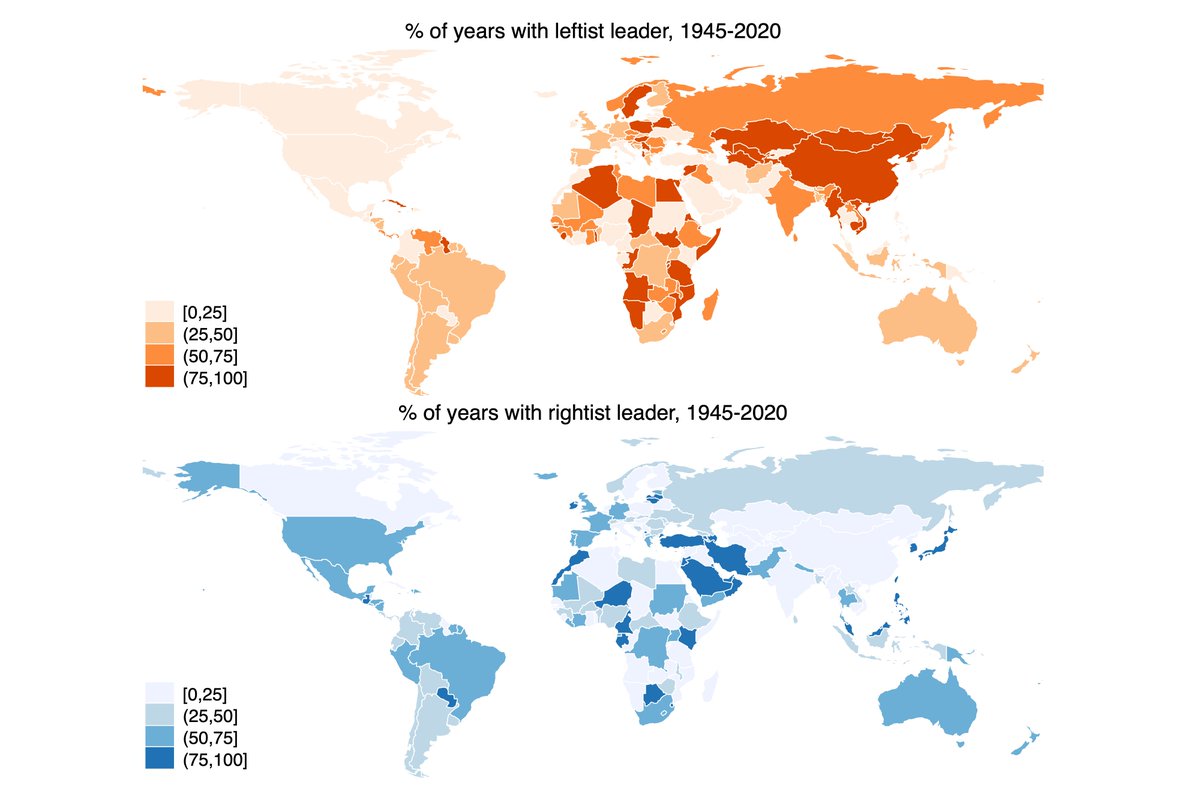
Social scientists have long studied — and often found — that leftist governments pursue different policies than rightist governments (read a recent summary here: bit.ly/3yNHzVn). But this research has mainly focused on OECD countries, neglecting other parts of the world. 

This focus on OECD countries in part is because researchers often use off-the-shelf datasets which only provide data on the ideologies of leaders and parties in OECD countries. This is where my GLI dataset comes in.
🚨 New Virtual Lecture Series: Historical Political Economy of Bureaucracy & State Building 🚨
As a part of my class on HPE of bureaucracy (janvogler.net/Class_08_HPE_B…), I’m announcing a lecture series hosted at @UniKonstanz.
Details in this 🧵. (1/9)
#polisciresearch #EconTwitter
As a part of my class on HPE of bureaucracy (janvogler.net/Class_08_HPE_B…), I’m announcing a lecture series hosted at @UniKonstanz.
Details in this 🧵. (1/9)
#polisciresearch #EconTwitter
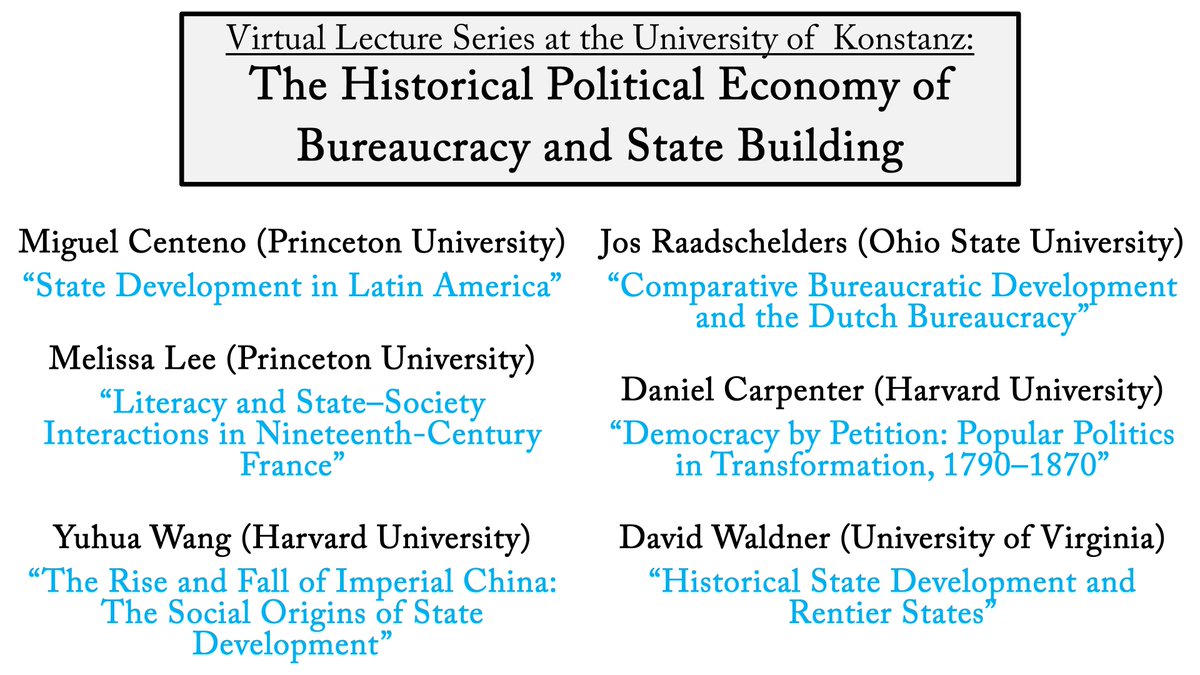
1. Guest Lecture: Miguel Centeno (@PrincetonSPIA) on “State Development in Latin America”
Day: Friday, November 19, 2021
Time: 3.00–4.30 PM CET / 9.00–10.30 AM ET
Link to Profile: sociology.princeton.edu/people/miguel-…
(2/9)
Day: Friday, November 19, 2021
Time: 3.00–4.30 PM CET / 9.00–10.30 AM ET
Link to Profile: sociology.princeton.edu/people/miguel-…
(2/9)
2. Guest Lecture: Melissa Lee (@PUPolitics) on “Literacy and State–Society Interactions in Nineteenth-Century France” (2021 Best Article Award by @ApsaEuro)
Day: Friday, December 3, 2021
Time: 3.00–4.30 PM CET / 9.00–10.30 AM ET
Link to Article: doi.org/10.1111/ajps.1…
(3/9)
Day: Friday, December 3, 2021
Time: 3.00–4.30 PM CET / 9.00–10.30 AM ET
Link to Article: doi.org/10.1111/ajps.1…
(3/9)
Democrats have increasingly focused on appeals to their affiliated identity groups in recent years, without much change among Republicans
#polisciresearch diss
escholarship.org/content/qt4k12…
#polisciresearch diss
escholarship.org/content/qt4k12…
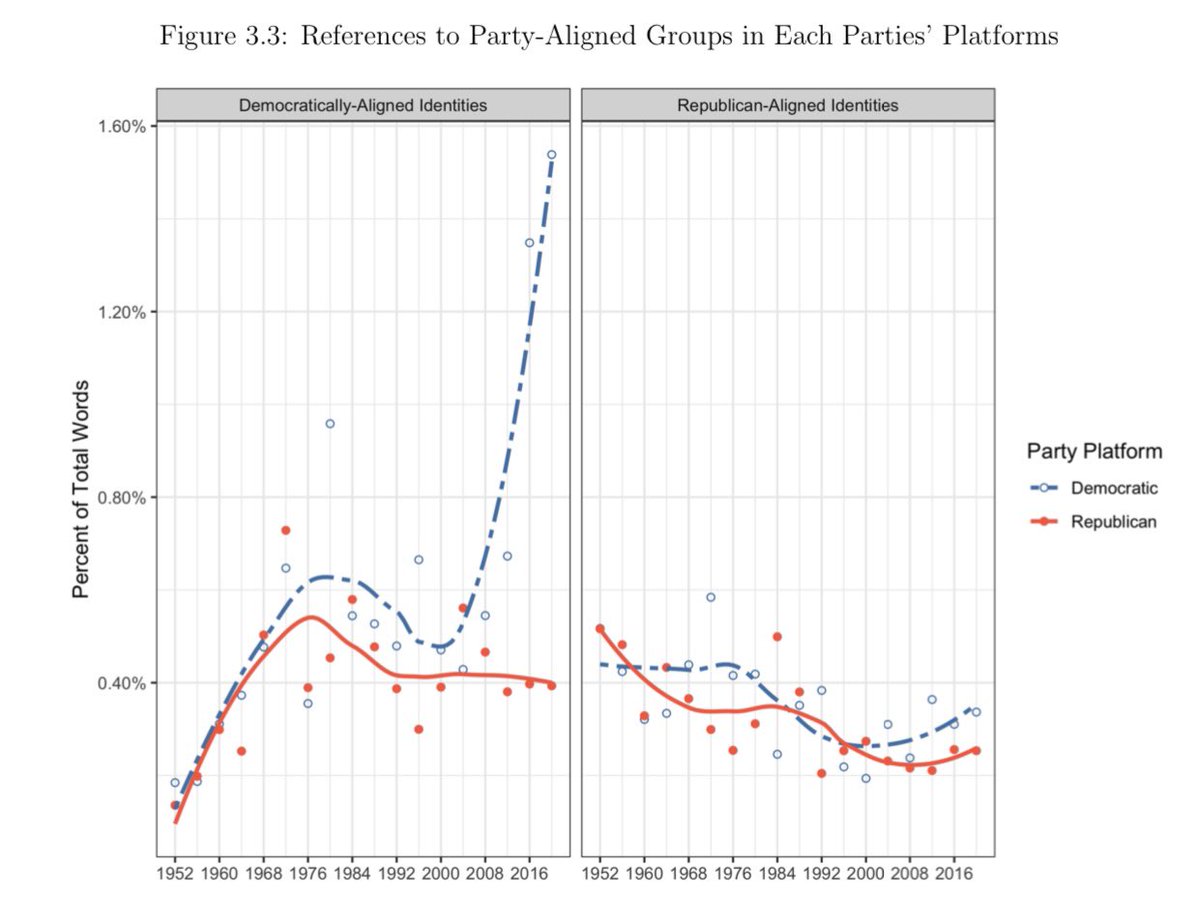
Republicans have increased their appeals to conservatism lately but referenced liberalism a lot less often
escholarship.org/content/qt4k12…
escholarship.org/content/qt4k12…

The diss finds limited evidence that identity appeals increase affective polarization, though affective polarization is increasing with Democratic diversification. Interestingly, the Republican Party is relatively stable on racial & religious composition
escholarship.org/content/qt4k12…
escholarship.org/content/qt4k12…
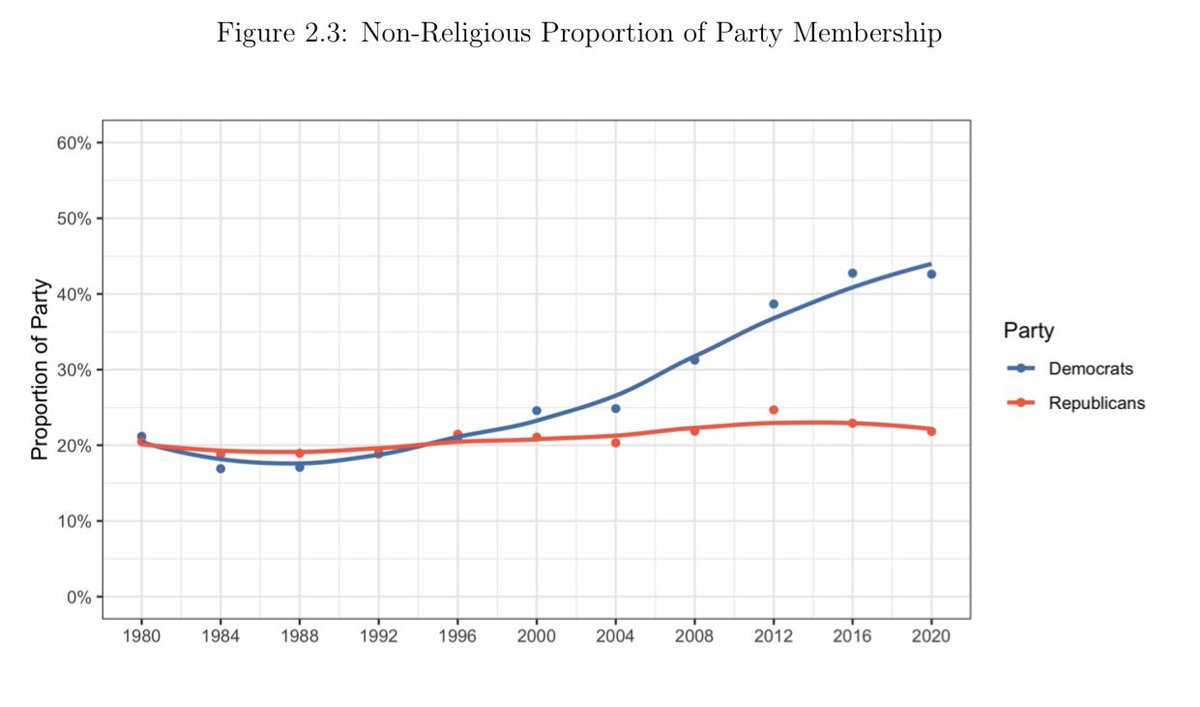
Looking for good news? The Increasing Viability of Good News, with @ykrupnikov, a NEW #cambridgeelements in Politics & Communication, is now published & FREEly available here! #polisciresearch #commresearch #journalism @CUP_PoliSci @umisrcps [1/5]
cambridge.org/core/elements/…
cambridge.org/core/elements/…
Motivated by pandemic-period news content, we argue that shifts in the nature of news & technology alongside individual differences in news preferences may lead to MORE POSITIVE news coverage over time. [2/5] 

For #PolCom researchers, the book helps explain trends in attentiveness to predominantly negative - but also some positive - content. For those involved in #journalism, our findings may signal an increasing market for positive news. [3/5]
NEW at @apr_journal: I provide new evidence that Republicans (and not Democrats, as is sometimes assumed) are more likely to endorse anti-vax. misinfo.
This effect isn't new, and anti-expert attitudes may help explain why. #polisciresearch
journals.sagepub.com/eprint/C5CZCID…


This effect isn't new, and anti-expert attitudes may help explain why. #polisciresearch
journals.sagepub.com/eprint/C5CZCID…


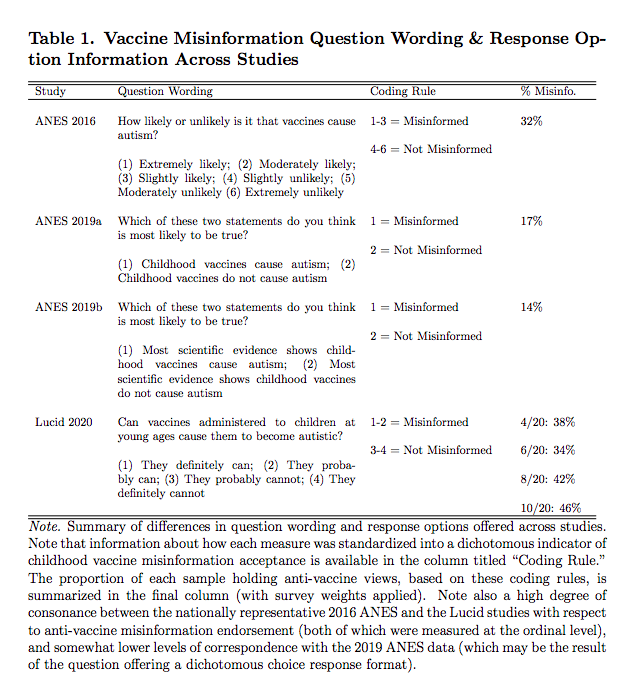
First, some background.
Popular press efforts to document the prevalence of anti-vax. opinion often suggest (either tacitly or explicitly) that Democrats are more likely than Republicans to endorse anti-vaccine views.
Popular press efforts to document the prevalence of anti-vax. opinion often suggest (either tacitly or explicitly) that Democrats are more likely than Republicans to endorse anti-vaccine views.
Several, for example, suggest that "Whole Foods moms" [1] -- a grocery chain with a left-leaning reputation [2] -- end to be more likely to doubt childhood vaccine safety.
[1] inquirer.com/news/middle-cl…
[2] fivethirtyeight.com/features/senat…
[1] inquirer.com/news/middle-cl…
[2] fivethirtyeight.com/features/senat…
🚨 What are the political consequences of pandemics? 🚨
D. Gingerich & I analyze history’s deadliest #pandemic in a brand new @World_Pol article: “Pandemics & Political Development: The Electoral Legacy of the #BlackDeath in Germany”
doi.org/10.1017/S00438…
#polisciresearch 🧵
D. Gingerich & I analyze history’s deadliest #pandemic in a brand new @World_Pol article: “Pandemics & Political Development: The Electoral Legacy of the #BlackDeath in Germany”
doi.org/10.1017/S00438…
#polisciresearch 🧵

Brief summary (#TLDR): The Black Death (BD) had a significant long-term impact on Germany’s political development. Hard-hit areas introduced proto-democratic institutions; sustained experiences with participative government later helped reject antidemocratic & illiberal parties. 

1/x: Polls keep showing that Republicans believe objectively false ideas, but have conservatives really lost their grasp on reality or have they decided to just lie about it to pollsters?
Join me for this summary thread or click through to my essay here: flux.community/matthew-sheffi…
Join me for this summary thread or click through to my essay here: flux.community/matthew-sheffi…
American conservatism is based on a modern Christian fundamentalism which believes the Bible is literally and completely true.
This is something everyone, including them, knows to be nonsense. But this realization has psychically damaged conservatives flux.community/matthew-sheffi…
This is something everyone, including them, knows to be nonsense. But this realization has psychically damaged conservatives flux.community/matthew-sheffi…
As a result, the far-right is in "epistemic collapse," they know that their arguments are unprovable but they still want to believe.
Michael Flynn's Covid election conspiracy below is a great illustration. He refers to "my truth," not the truth
Michael Flynn's Covid election conspiracy below is a great illustration. He refers to "my truth," not the truth
Polled issue opinions are associated with ballot initiative outcomes but popular policies underperform; voters systematically prefer the "no" option
#polisciresearch
dropbox.com/s/zn2uf6kyv8id…
#polisciresearch
dropbox.com/s/zn2uf6kyv8id…
Great generalization of the research on how Washington's real-world campaigns reduced support for climate initiatives by 20 percentage points:
papers.ssrn.com/sol3/papers.cf…
papers.ssrn.com/sol3/papers.cf…
CW among consultants is that an initiative should start with 2/3 support in the polls to pass (with 50%), usually explained not just as status quo bias but responsiveness to negative information; eg, con spending on initiatives is more important than pro:
amazon.com/Populist-Parad…
amazon.com/Populist-Parad…
Here's a new #polisciresearch working paper & a 🧵.
We all know about 1/6 and the threat to American democracy that crystalized that day.
Were there *changes* in American public opinion in the years before that foreshadowed the threat?
Not really.
papers.ssrn.com/sol3/papers.cf…
We all know about 1/6 and the threat to American democracy that crystalized that day.
Were there *changes* in American public opinion in the years before that foreshadowed the threat?
Not really.
papers.ssrn.com/sol3/papers.cf…

Both district policy opinion & symbolic ideology influence how lawmakers cast roll call votes; the operational-symbolic divide in public opinion explains why Republican lawmakers vote more inconsistently with district policy opinion
#polisciresearch
cambridge.org/core/journals/…
#polisciresearch
cambridge.org/core/journals/…
Americans are using a bit more ideological language in explaining their party attachment over time, though the growth is mostly among Republicans; Democrats still use a lot more group benefits language
#polisciresearch automated coding of likes/dislikes
dropbox.com/s/ho4h6ne58w6l…
#polisciresearch automated coding of likes/dislikes
dropbox.com/s/ho4h6ne58w6l…

Some of what is coded as "nature of the times" also looks like policy issue content, which might help reconcile this paper with Wattenberg's analysis:
This paper also only uses in-party likes.
You can see the common words in each category below.
This paper also only uses in-party likes.
You can see the common words in each category below.

Voter conceptualizations are surprisingly uncorrelated with our party messages data. Both Republican voters & politicians talk about ideology more & groups less (& Democrats the reverse) but partisans aren't responsive to year-to-year changes in rhetoric.
Republicans & Democrats represent different interest group sectors & economic classes. We have organized elite competition, not oligarchy. But that still provides multiple paths for unequal public class influence
My latest with @wsisaac & Zuhaib Mahmood:
journals.uchicago.edu/doi/abs/10.108…
My latest with @wsisaac & Zuhaib Mahmood:
journals.uchicago.edu/doi/abs/10.108…
Republican leaders' positions on policy are more closely associated with the opinions of the upper class (top 10%) on economic policy. Democratic leaders' positions more closely match those of the middle class
#polisciresearch
journals.uchicago.edu/doi/abs/10.108…
#polisciresearch
journals.uchicago.edu/doi/abs/10.108…

@mrmabatim & I are delighted to have our article 'When disconnected institutions serve connected publics: subnational legislatures and digital public engagement in Nigeria', published in The Journal of Legislative Studies, @tandfonline ed @LordNortonLouth 1/9
We examined the extent to which #Nigeria’s 36 state assemblies leverage active citizen online presence for digital public engagement. @lshaofficial @oyoassembly @adamawaassembly @abiahouse @ondoassembly @ekitistateHA @kwhanigeria @housePlateau @realOSHoA
2/9
2/9
We argued that for assemblies to improve their public image, public understanding of their roles, and to be more transparent and inclusive, they must improve digital engagement practices, using tech as enabler of enhanced transparency and inclusiveness.
3/9
3/9
Across 49 political ads in 2016, experiments find extremely small effects on candidate favorability & vote, regardless of partisanship, positive or negative tone, battleground area or not, primary versus general, or early versus late
#polisciresearch
advances.sciencemag.org/content/6/36/e…
#polisciresearch
advances.sciencemag.org/content/6/36/e…
It looks like these were all presidential ads, so a remaining area of potential heterogeneity is level of office & associated competing information environment & strength of existing views
More here:
https://t.co/8bumBjhObN
More here:
https://t.co/8bumBjhObN
Note that an extremely small effect of seeing a TV ad on vote choice may still be worth it, compared to the other options available to campaigns:
A nice new @dylanmatt overview of the persuasion & mobilization literature today:
vox.com/21366036/canva…
A nice new @dylanmatt overview of the persuasion & mobilization literature today:
vox.com/21366036/canva…
New preprint, whose main point can be summarized by 3 maps: the share of Catholics in Western German regions (center) strongly correlates with AfD vote shares (right) when taking into account whether the region historically belonged to Prussia (left). Why? #polisciresearch (1/12) 

I will now start labeling new political science research with the #polisciresearch hashtag in the hopes that it leads to more coordination & research sharing.
#SocSciResearch will still be available for the archive & my tweets of non-polisci papers.
Thanks @dhopkins1776
#SocSciResearch will still be available for the archive & my tweets of non-polisci papers.
Thanks @dhopkins1776
I will try to do a regular #polisciresearch search & boost new papers.
Please tweet your summaries, even if I've already linked.
My advice is to tweet Findings Not Topics, even if they are descriptive or summaries of literatures & even when you expand in a tweet thread below.
Please tweet your summaries, even if I've already linked.
My advice is to tweet Findings Not Topics, even if they are descriptive or summaries of literatures & even when you expand in a tweet thread below.










